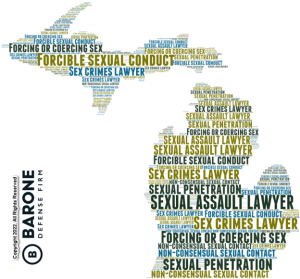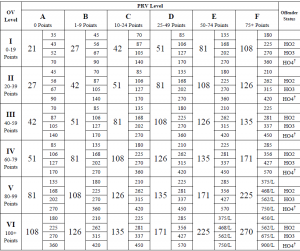Search
What is the Punishment for Michigan Criminal Sexual Conduct?
 Michigan Criminal Sexual Conduct, commonly referred to as CSC, is the unlawful sexual assault or touching or penetration of another. In Michigan, there are four separate offenses each defined by the acts of behaviors of the alleged offender.
Michigan Criminal Sexual Conduct, commonly referred to as CSC, is the unlawful sexual assault or touching or penetration of another. In Michigan, there are four separate offenses each defined by the acts of behaviors of the alleged offender.
Each level of offense is called a “degree.” In order to support an allegation, the state must demonstrate a range of factors or legal ideas that are present in each degree of the charge. Such variables may include the age of the victim, the relationship of the perpetrator to the victim, and whether force or coercion was used in the commission of the alleged crime.
Punishment for Michigan Criminal Sexual Conduct
Because the various degrees of criminal sexual conduct are thought of as more or less serious, they also carry different penalties.
- CSC 1st Degree is the most serious offense. The potential penalty includes a maximum sentence of up to life in prison and often would require a mandatory 25-year minimum prison sentence in the Michigan Department of Corrections. It also may include lifetime electronic monitoring, which is a tether required to be worn and monitored. In addition to punishment, it would require registration on the sex offender registry, SORA.
- CSC 2nd Degree encompasses an unlawful sexual touching. This offense carries a maximum sentence of 15 years in prison and would require registration on the sex offender registry.
- CSC 3rd Degree is also a maximum of 15 years in prison and registration on the sex offender registry. However, CSC 3rd Degree is considered a more serious offense than CSC 2nd Degree because it includes “penetration” rather than sexual touching.
- CSC 4th Degree is known as a high court misdemeanor. Generally, an offense that carries more than a 1-year jail/prison sentence is considered a felony, and an offense punishable by 1 year or less is considered a misdemeanor. CSC 4th degree has a maximum of two years in prison; hence, it is labeled as a high court misdemeanor.
However, if the offense is charged or amended to an attempted CSC 4th Degree, then it is considered a 1-year misdemeanor. Both CSC 4th and Attempted CSC 4th require registration.
How Punishment is Determined – Michigan Sentencing Guidelines
 In Michigan, judges, prosecutors, defense attorneys, and probation officers all use the Michigan Sentencing Guidelines to determine your sentence on a Michigan Sex Crime Case. The Guidelines are a statutory structure or scheme to determine the range within which a sentence should fall. The Michigan sentencing guidelines are modeled after the Federal sentencing guidelines. While the sentencing guidelines are no longer mandatory in Michigan, they are still highly persuasive.
In Michigan, judges, prosecutors, defense attorneys, and probation officers all use the Michigan Sentencing Guidelines to determine your sentence on a Michigan Sex Crime Case. The Guidelines are a statutory structure or scheme to determine the range within which a sentence should fall. The Michigan sentencing guidelines are modeled after the Federal sentencing guidelines. While the sentencing guidelines are no longer mandatory in Michigan, they are still highly persuasive.
Sentencing guidelines only refer to the minimum sentence, while the maximum penalty is set forth by the criminal statute as set forth above. So, when a judge says sentencing is 18 months to five years, the 18 months might be from the guidelines whereas the 5 years is from the criminal statute.
The Sentencing Guidelines are calculated based upon the individual defendant’s criminal history, called “Prior Record Variables”, or PRVs, and based on the specific facts of the case, called “Offense Variables”, or OVs. Once these variables are scored, which means assigned numbers, then a sentencing grid is used to calculate the guideline range.
These grids are similar to the multiplication grids or times tables used to help youngsters learn multiplication. There is more than one sentencing grid, and different crimes use different grids. Criminal Sexual Conduct cases are categorized as a “Crime Against a Person”, and after calculating the PRV and OV for a Crime Against a Person, the guidelines range is calculated using this Grid, and in this way, the judge determines what might be a reasonable and appropriate sentence.
CSC in Michigan
Michigan’s sex offender registry requires a mandatory sex offender registration for those who’ve been convicted of both minor and major sexual offenses. When it comes to the age of consent (16 years old), the state of Michigan won’t prosecute if the age gap is four years or less.
Examples of CSC in Michigan include, but are not limited to:
- Indecent liberties and exposure to a minor
- Child porn
- Kidnapping of a minor
- Rape, sexual assault, sexual misconduct, and human trafficking
- Prostitution
Does Michigan Require a Sex Offender Registry for All Criminal Sexual Conduct Convictions?
Yes, but only for offenders who committed offenses from October 1, 1995, onward. In 1996, the state of Michigan passed a law called the Michigan Sex Offenders Registration Act, requiring all offenders to register their personal details on a public database. This mandatory sex offender database is accessible to all 50 states and easily accessible by typing in a name and state.
The registry provides photo identification, contact information, a physical description (including distinguishing features), and details of their crime. Sex offenders are required to continuously update their details with law enforcement — failure to do so could see them facing another criminal charge.
Not every sexual conduct offense is the same, which is considered when determining how long a name will remain in the registry (a minimum of 15). There are first-degree, second-degree, and third-degree criminal sexual conduct offenses, which categorize the severity of the crime.
The law was passed to protect the public and ensure they are aware of threats within their community. Although developed to protect the public done with good intentions to the public, it has resulted in vigilante behavior and targeted attacks on those on the registry, causing another host of problems.
Habitual Offender Penalty
Michigan law dictates that you can receive a minimum of a 5-year sentence if you are convicted of CSC again. Even if you committed a crime outside the state, you are still considered a habitual offender.
There is also a penalty under the Michigan Sentencing Guidelines for Habitual Offenders. For individuals with a history of multiple felony offenses in Michigan, the habitual offender law entails escalating penalties.
For example, if you are charged with a second felony offense, the prosecutor must serve you with a habitual notice, usually within 14 days. This notice will indicate that if you are found guilty of the habitual enhancement, then the penalty for the underlying CSC would be increased by 25% augmentation.
If you pick up a third felony offense, then the habitual felony third conviction could lead to a more substantial increase to the underlying CSC crime of 50% on the maximum sentence associated with the crime. Furthermore, a fourth offense habitual conviction may carry the consequence of doubling the maximum sentence specified for the particular underlying CSC crime.
How the Barone Defense Firm Team Will Work to Obtain the Best Possible Sentence in Your Case
If there is a guilty plea, or no contest plea, or conviction to any criminal sexual conduct offense, then it is imperative that your attorney is well versed in understanding, researching, and litigating the legal issues within the Sentencing Guidelines. There are many variables that might apply and more than one way to calculate the guideline range. Consequently, it’s important to hire a lawyer with experience limiting and lowering the Guidelines because this will reduce your potential jail/prison exposure.
 In most cases and jurisdictions throughout Michigan, it is common for the Judge to order a minimum sentence consistent with the guidelines. However, as indicated, the guidelines are no longer mandatory.
In most cases and jurisdictions throughout Michigan, it is common for the Judge to order a minimum sentence consistent with the guidelines. However, as indicated, the guidelines are no longer mandatory.
If good cause exists a Judge may deviate or order a ‘downward departure’ from the guidelines. Similar to achieving a more favorable guideline calculation, this downward departure is accomplished through zealous and persuasive advocacy by your experience Michigan criminal sex crimes attorney prior to and at the time of sentencing.
There are many other ways to modify the outcome during sentencing. In fact, sentencing is the most neglected area of advocacy for most criminal defense attorneys. The Barone Defense Firm has one of the Nation’s top sentence Mitigation Lawyers on the Team, and this is one reason why we’ve consistently achieved unbelievable results for our clients.
Contact us today to learn how we can leverage our defense team to work toward an unbelievable result in your case. It’s important that you hire a lawyer to represent you as soon as you think you may be under investigation.
 Michigan Criminal Defense Lawyer Blog
Michigan Criminal Defense Lawyer Blog

